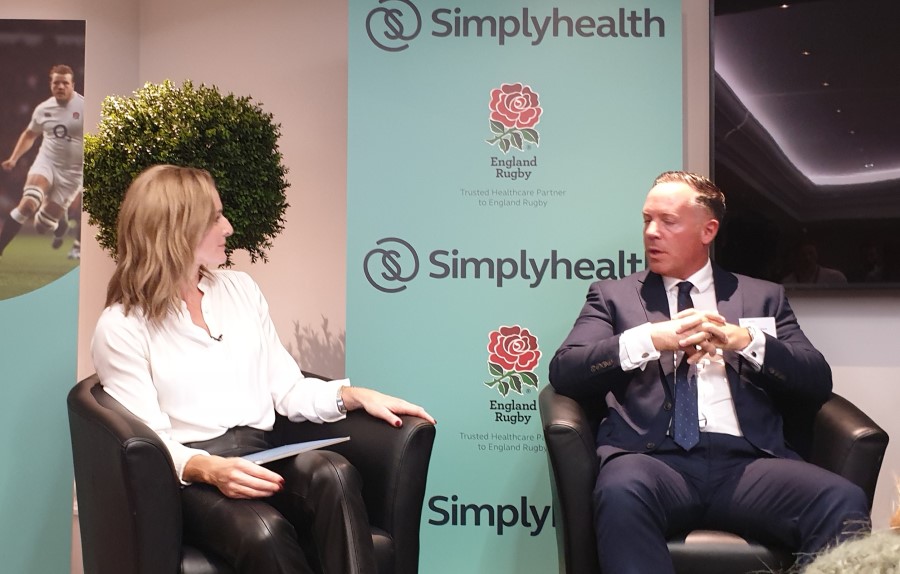The resilience lessons elite sport can teach everyone in your workforce
 Pictured: Sports presenter Gabby Logan and Dr Shaun Davis, Global Director of Safety, Health, Wellbeing and Sustainability at Royal Mail Group.
Pictured: Sports presenter Gabby Logan and Dr Shaun Davis, Global Director of Safety, Health, Wellbeing and Sustainability at Royal Mail Group.
But there are few careers where resilience and the ability to cope with adversity are more important than in professional sport.
Top practitioners from business joined forces with international rugby stars at a panel debate hosted by Simplyhealth, to explore whether business can learn from sport – and vice versa.
Sports presenter Gabby Logan chaired a panel of Dr Shaun Davis, Global Director of Safety, Health, Wellbeing and Sustainability at Royal Mail Group; Peter Cheese, Chief Executive at CIPD; Richard Gillies, Chief Operating Officer at Simplyhealth, England Rugby Sevens player, Heather Fisher, and Dylan Hartley, ex-England Rugby Captain.
“We are in a time of profound economic and social change,” says Peter Cheese. “We are starting to be clear that stress is an employer’s problem and younger workers are increasingly asking their employers: ‘Why don’t you look after me?’”
Cheese outlined what he believes are the two biggest priorities for business at present: how business leaders should best look after employees, and the environmental sustainability of the organisation. “We have to ask what drives a culture of thinking differently about people, where they can be themselves and not think 'I’m going to be judged'”.
Some of the panel’s tips for creating a resilient workforce that can cope with adversity included:
Establish a framework for giving feedback: “In elite sport, feedback is different,” says Hartley. “It is direct and you have to give it straight away. It can be a really tough learning curve – but people accept that’s the way feedback is done.”
In the workplace, the panel said that equates to establishing a framework for how feedback is given. “You have to be receptive to how you give feedback – people need different things. And, as a leader you have to balance that against what you need to achieve.”
Help leaders build resilience: “Being a leader can be a lonely space and you need to set an example,” adds Hartley. He says as a leader it’s important to ‘earn credit’ with a team or workforce every day, to develop trust and a solid relationship. “I was lucky that I had a good mentor who gave me feedback to help me improve my leadership style.”
Support the whole person: “I’m a female in a male sport, and I have alopecia (which causes hair loss), so people form opinions of me based on what they see on the pitch,” says Heather Fisher. “But it’s really important for me to get across that I have a very vulnerable side too. I need to be myself- then I can play to the top of my ability. I've had coaches that don't get me and I can't work well in an environment where I'm not happy.”
Find key influencers: Finding individuals who can help to influence the behaviour of a whole team is an important element of improving culture or driving wellbeing. “They can help you with what you are trying to achieve, and to build a squad that is resilient,” says Hartley.
Get commitment from the top: “At Royal Mail, being resilient and developing our culture has been driven by CEOs who have been incredibly supportive of our agenda. Rico Back, our current CEO, is very visible in his support, and that is invaluable,” says Davis.
Make the strategy appropriate for your workforce: “I hate the phrase, ‘it’s on the intranet’, Davis adds. “It’s a very lazy way of communicating. At Royal Mail, for example, many of our staff don’t have access to the intranet. You have to ask how do you take your key messages and communicate them to your people? We have learnt that if we provide people with the tools to talk about wellbeing, mental health, resilience and sustainability, they can use their connections in the community to speak to others.”
Take a long-term view: “Don’t be thrown if figures seem to get worse before they get better when you are trying to change things,” says Davis. “When we first started focusing on mental wellbeing at Royal Mail, our absences due to mental health went up. But, at the same time, ‘bad backs’ and ‘stomach aches’ went down, so we could see that people were being more open about their mental health.”
Be authentic: “You have to live your values,” concludes Richard Gilles. “If it falls to just being a corporate programme, then you are lost. You have to build an environment where there is a sense of purpose and belief.”
The author is Maggie Williams, content director at REBA.






